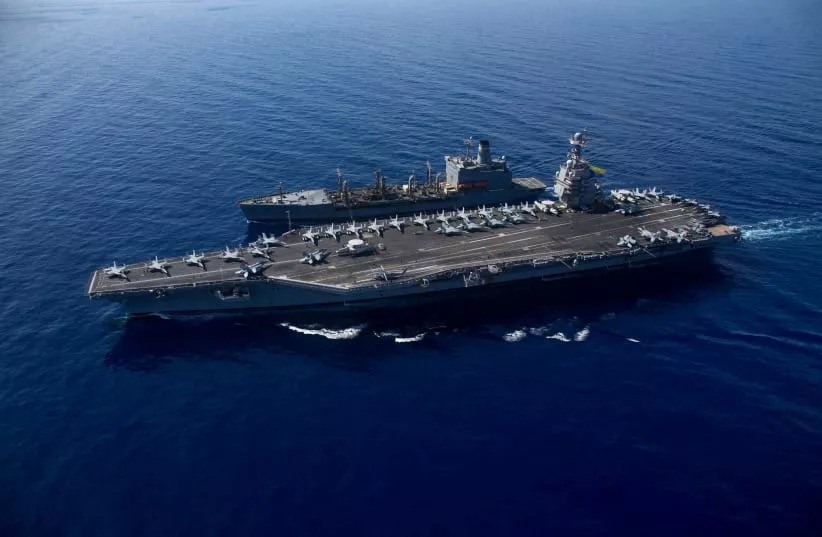The “Amalthea” plan may have faded from the spotlight (in terms of publicity), but it has not disappeared from American plans.
The United States has taken up the issue of the humanitarian corridor, which is reflected at various levels, diplomatically and militarily.
On the diplomatic front, an update was provided to the permanent missions at the United Nations in New York last night.
The briefing on the “Amalthea” humanitarian corridor aimed at transporting aid from Cyprus to Gaza was jointly conducted by the United States and the Republic of Cyprus.
Beyond this joint event between the permanent missions of the United States and the Republic of Cyprus, Washington has also planned other informational meetings for the “Amalthea” plan.
In the coming days, as informed by Nicosia, U.S. diplomatic missions in the European Union, Asia, and Latin America are organising large-scale informational meetings in the capitals where they are located.
The update will cover the presentation of the entire plan and how humanitarian aid will practically be transported from Larnaca to Gaza.
By actively engaging in the entire operation, the Americans show that the “Amalthea” plan has not only not died but, on the contrary, intensive processes are underway to fully implement it.
Apart from diplomatic mobilisations, on a military level, it is expected that within the next 24 hours, the construction of the pier off the coast of Gaza will begin to assist in the transportation of humanitarian aid from sea to land. The aid will be transported by ships that will operate from Larnaca to Gaza.
The entire U.S. naval mission docked at the Souda Bay base in Greece before proceeding to Gaza to construct the pier.
According to a report from the Israeli newspaper “Jerusalem Post,” the ships belong to the 7th Transportation Brigade of the 18th Airborne Corps of the U.S. Army. In March, the U.S. Central Command stated that the ships “from the 7th Transportation Brigade (Expeditionary), 3rd Expeditionary Support Command, XVIII Airborne Corps, departed from the Joint Base Langley-Eustis en route to the Eastern Mediterranean to create a roll-on, roll-off pier capability that allows the ship to offload humanitarian aid in Gaza. The SP4 James A. Loux, Monterrey, Matamoros, and Wilson Wharf are transporting equipment and supplies required to establish a temporary pier for the delivery of critical humanitarian supplies.”
According to the Vessel Finder website, the ships are now anchored at the naval base in Crete located in Souda Bay.
These include the USAV Matamoros, USAV James A. Loux, USAV Monterrey, and USAV General Frank S. Besson Jr. However, the USAV Wilson’s Wharf appears to be in the Canary Islands in a port near Tenerife. It is not clear why it is lagging behind or if it was sent for a different mission.
It should also be noted that the journey of the U.S. fleet serves as a significant logistical test to determine how these ships can cross oceans and transport essential capabilities in a conflict zone. If they reach Gaza, this will provide essential training during a real-time crisis.
The ships departed from Fort Eustis on the James River on March 12 to cross the Atlantic Ocean and reach Gaza. They travelled along the Chesapeake Bay and then headed south along the coasts of the Carolinas into the open sea, passing Bermuda to reach the coasts of Spain and Africa before crossing the Mediterranean.
They are on the same side
The positions of Cypriot and American officials have made it clear that Cyprus and the U.S. are on the same side regarding the crisis in the Middle East, especially concerning finding ways to transport humanitarian aid from Larnaca to Gaza.
Foreign Minister Konstantinos Kompos, in recent statements, clarified Cyprus’s orientation. On the other hand, U.S. Ambassador Julie Fisher, speaking at the Delphi Forum, praised Cyprus’s efforts for the region.
She noted that “it’s not just a matter of geography but also the position of the Christodoulides government: ‘For me and Washington, the Amalthea plan was not surprising’,” she said, emphasizing that both President Christodoulides and other partners in this venture realised early on that no one could achieve it alone.”






